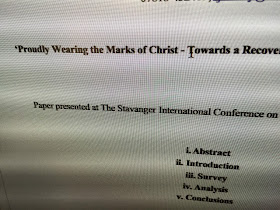image from here.
Stigma is defined thusly:
"A mark of disgrace associated with a particular circumstance, quality, or person"
"(in Christian tradition) marks corresponding to those left on Christ's body by the Crucifixion, said to have been impressed by divine favour on the bodies of St Francis of Assisi and others"
I actually disagree. I don't think that 'stigmata' can be so easily defined. And I think that the reality of it - or, at least, the reality of Paul's shared experience of 'stigmata' as recorded in Galatians 6:17 - is more complex. Reality is usually more complex. Let's recap what Paul said:
"From now on, let no one cause me trouble, for I bear on my body the marks of Christ"
____________________________
If you'd like to discuss this paper and understanding of 'stigmata', then I'd love to connect with you via Facebook or Twitter, or you could leave a comment below.


No comments:
Post a Comment
Hey! Thanks for commenting. I'll try to moderate it as soon as possible